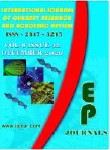Abstract Volume:8 Issue-12 Year-2020 Original Research Articles
 |
Online ISSN : 2347 - 3215 Issues : 12 per year Publisher : Excellent Publishers Email : editorijcret@gmail.com |
2Shri Bhagwan Mahavir Vitreoretinal Services, Sankara Nethralaya, Chennai, Tamil Nadu, India
Globally, pandemic Corona Virus 2019 has gained attention for its rapid and exponential diffusion. It has imposed an unprecedented threat to mental and physical well-being of the individual and the society. This study aims to investigate the impact of immediate changes on the mental well-being among the covid survivors by quantifying the magnitude of symptoms of fear of COVID, Corona Anxiety and Impact of the event and potential risk factors associated with these symptoms. A cross sectional, Observational, study was conducted from June to August 2020 on persons of both the gender, aged 18 years or above. A total of 220 respondents (COVID – 19 survivors) participated in the study. A survey questionnaire was provided to the patients through online Google form and distributed through social media platform, which includes, demographics, Fear of COVID – 19 scale, Impact of Event – revised scale and COVID Anxiety scale to assess the psychological effects of COVID-19 survivors. Findings suggest a significant negative correlation between age and anxiety (r= -0.007, P ≤ 0.001), age and fear of COVID (r= -0.004, P ≤ 0.05) and age and IES - R (r= -0.010, P ≤ 0.001). Younger populations had higher anxiety levels (F = 0.103, P ≤ 0.057), where older population had higher levels of fear (F = 1.04, P=0.03). Respondents with lower education level were more anxious (p=0.027) and fear (p=0.01) from COVID-19 while there was no significant difference in IES - R score based on education level. Pearson correlation test showed that there is significant positive correlation exist between FCV, IES-R and CAS. Female gender has significantly higher anxiety and fear of COVID, when compared to their male counterparts. Younger participants score higher levels of anxiety, where older populations had higher levels of fear. Higher education individuals show lower levels of anxiety and depression. There exist a high prevalence of mental health problem among COVID 19 survivors.
How to cite this article:
Rama, V. and Anitha Rani, A. 2020. A Study on Immediate Mental Well- Being among COVID-19 Survivors.Int.J.Curr.Res.Aca.Rev. 8(12): 1-8doi: https://doi.org/10.20546/ijcrar.2020.812.001



Quick Navigation
- Print Article
- Full Text PDF
- How to Cite this Article
- on Google
- on Google Scholor
- Citation Alert By Google Scholar
